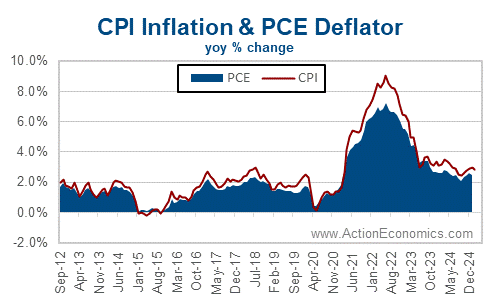The FOMC will issue its post-meeting statement at 18:00 GMT tonight. “High-for-longer” is the expected outcome (but not higher) given more indications that progress on bringing inflation sustainably down to the 2% target has stalled out. With no new quarterly forecasts, it will be all about Chair Powell’s press conference when the Fed announces its policy stance tonight.
The major question at this point will be how hawkish will he be?
It is unlikely to be any more hawkish than what the markets are pricing in. Indeed, Chair Powell will have to acknowledge that the data are going the wrong way and he may even pre-empt the likely first question out of the box, “is a rate hike in the cards?”
Meanwhile, Fed funds futures have not only fully priced out chances for a rate cut for this meeting and for June, but July as well. Risk for a reduction in September fell to below 50-50 on the initial spike in implied rates on the ECI news. The November contract reflects 20 bps in cuts, with a full quarter point easing now not seen until December. The FOMC is also expected to announce a slowing in Treasury runoff for June.
Economic Projections & Market Interpretation:
The March update of the SEP revealed notable adjustments in key economic indicators. GDP forecasts for 2024 experienced a substantial upward revision, reflecting a more optimistic outlook with a growth rate of 2.1%, up from 1.4% in December. Similarly, projections for 2025 saw improvements, with the median jobless rate forecasts showing mixed trends but generally aligning with recent patterns. Expectations for headline and core PCE chain price indices also witnessed slight adjustments, indicating potential shifts in inflation dynamics.
During the March meeting, the “dot plot” estimates hinted at a dovish stance by Fed members, with no indications of further rate hikes and median estimates suggesting potential rate cuts in 2024. This interpretation led markets to anticipate the initiation of quarterly rate cuts starting in June. As investors await the June SEP update, there is speculation about further adjustments in GDP estimates, PCE chain price indices, and the potential revision of rate cut expectations.

Analyzing the labor market reveals a complex picture of recovery and ongoing challenges. Payrolls have shown resilience in 2024, surpassing the previous year’s averages, albeit with variations across sectors. Despite improvements, the jobless rate remains a focal point, with fluctuations reflecting broader economic conditions. Additionally, metrics like the U-6 rate and wage growth provide insights into the labor market’s health and potential inflationary pressures.
Inflation Trends and Consumption Patterns:
Inflation dynamics have been closely monitored, particularly amid recent fluctuations in commodity prices and supply chain disruptions. While recent CPI and PCE chain price measures suggest some moderation in inflationary pressures, concerns linger about the sustainability of these trends. The Fed’s attention to inflation remains paramount, shaping expectations for future policy actions.
Consumer spending, a key driver of economic growth, has exhibited resilience despite ongoing uncertainties. Real personal consumption expenditures (PCE) have maintained positive growth rates, contributing to overall GDP expansion. However, shifts in consumption patterns and potential impacts on future economic performance warrant careful observation.
Market Expectations and Implications:
As the FOMC meeting approaches, market participants are closely monitoring economic indicators and policy developments for insights into future market dynamics. The verbiage of the Fed statement and subsequent press briefing will be scrutinized for any hints regarding the timing of potential policy adjustments. Investors should remain vigilant and adaptable, considering the evolving economic landscape and its implications for investment strategies.
The upcoming FOMC meeting holds significant implications for investors and economic stakeholders. Understanding recent economic developments, market expectations, and potential policy shifts is essential for navigating the dynamic financial environment. By staying informed and proactive, investors can position themselves to capitalize on emerging opportunities while managing risks effectively.
Click here to access our Economic Calendar
Andria Pichidi
Market Analyst
Disclaimer: This material is provided as a general marketing communication for information purposes only and does not constitute an independent investment research. Nothing in this communication contains, or should be considered as containing, an investment advice or an investment recommendation or a solicitation for the purpose of buying or selling of any financial instrument. All information provided is gathered from reputable sources and any information containing an indication of past performance is not a guarantee or reliable indicator of future performance. Users acknowledge that any investment in Leveraged Products is characterized by a certain degree of uncertainty and that any investment of this nature involves a high level of risk for which the users are solely responsible and liable. We assume no liability for any loss arising from any investment made based on the information provided in this communication. This communication must not be reproduced or further distributed without our prior written permission.



















